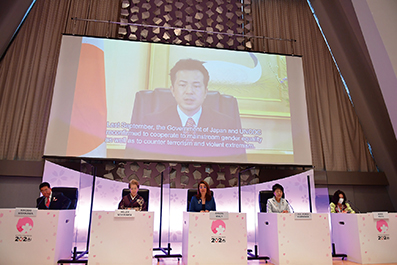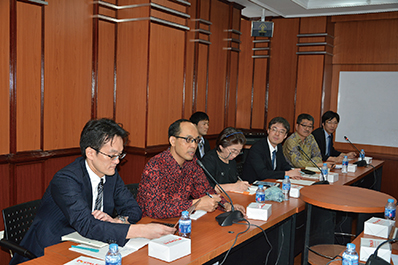2 Sharing Universal Values and Realizing a Peaceful and Secure Society
2-1 Assistance for Realizing an Equitable and Inclusive Society
(1) Assistance for the Development of Legal and Judicial Systems, and Economic Systems
In order to achieve “quality growth” in developing countries, it is necessary that the rights of individuals are guaranteed, that people can be engaged in socio-economic activities with a sense of safety, and that social infrastructure is equitably and stably managed. So as to strengthen such foundations, the sharing of universal values, such as freedom, democracy, respect for basic human rights, and the rule of law, realizing good governance, and ensuring peace, stability, and security are of great importance in developing countries.
In this regard, assistance for the development of legal and judicial systems is required to develop laws and to train legal and judicial personnel (including legal professionals and staff engaged in the correction and rehabilitation of offenders). It is also necessary to assist in the development of economic systems including human resources development, which involves the establishment of tax systems, appropriate collection, management, and execution of taxes, enhancement of audit functions of the public sector, and improvement of financial systems.
● Japan’s Efforts

A video message from then State Minister for Foreign Affairs Uto shown at a special event of the Kyoto Congress (March 2021)

Japanese experts dispatched to Indonesia holding discussions on strengthening the system for protection of intellectual property rights (Photo: JICA)
Japan provides assistance for the development of legal and judicial systems, and economic systems to countries such as Bangladesh, Cambodia, Côte d’Ivoire, Indonesia, Laos, Mongolia, Nepal, Sri Lanka, Timor-Leste, Uzbekistan and Viet Nam. It includes legal and judicial system reform, assistance in drafting laws and regulations, capacity development of national and local government officials for the operation and execution of legal systems, enhancement of internal audits, and the establishment of civil codes, competition law, intellectual property law, tax, internal audit, and public investment systems. In particular, in Laos, as a result of Japan’s continuous support for the development of legal and judicial systems for over 20 years, the country’s first civil code entered into force in May 2020, and currently operational support for this is being provided. In this way, the development of legal and judicial systems and economic systems in developing countries leads to improvements in the business environment for Japanese companies to be active in these countries. Japan’s assistance for the development of legal and judicial systems and economic systems draws on Japan’s “soft power” and promotes and underpins growth in the world, including Asia.
In March 2021, the 14th United Nations Congress on Crime Prevention and Criminal Justice (Kyoto Congress) was held in Kyoto, with Japan as the host country, in cooperation with the United Nations Office on Drugs and Crime (UNODC) as the Secretariat. Under the overall theme of “Advancing crime prevention, criminal justice and the rule of law: towards the achievement of the 2030 Agenda,” there were discussions on international cooperation and technical assistance to prevent and address all forms of crime, including terrorism and new and emerging forms of crime. The Kyoto Declaration, which will serve as a medium to long-term guideline for the United Nations and its member states in the field of crime prevention and criminal justice, was adopted unanimously as the outcome document.
Japan also conducts international training courses, studies, and seminars aimed at strengthening the training of human resources development and other purposes. As in 2020, it was also difficult in 2021 to conduct them in person due to restrictions on overseas travel caused by the COVID-19 pandemic. Because of this situation, Japan provided online training on topics such as drafting legislation and legal training in accordance with the needs of each country with the participation of legal practitioners and lawmaking professionals including justice ministry officials, judges, and prosecutors, from countries including Indonesia, Laos, Sri Lanka, and Uzbekistan. Additionally, Japan participated in local meetings, workshops, and other activities.
Furthermore, in order to proactively promote assistance aligned with the needs of developing countries, Japan works to implement effective assistance by conducting broad and basic studies regarding the legal systems of the countries, and their interpretations and operations. In March 2021, Japan held the 10th Symposium on International Civil and Commercial Law “Law and Practices of Joint Venture in Four Southeast Asian Countries: Indonesia, Malaysia, Thailand, and Viet Nam” online as a forum to present the research results.
